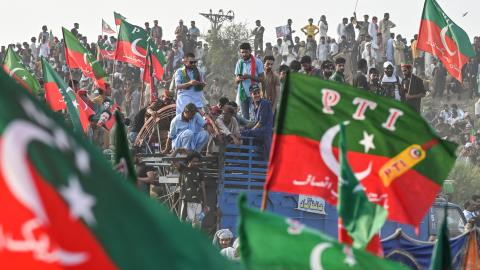Since 1958, the all-powerful military-intelligence combine has effectively run Pakistan, occasionally with a democratic façade. The hybrid model of governance requires that civilian politicians agree to operate within parameters determined by what Pakistanis euphemistically refer to as “the establishment”. It also depends on some level of secrecy for military manipulation and manoeuvres in the political arena.
Since his ouster as Prime Minister in April 2022 through a parliamentary vote of no confidence, cricketer-turned-politician Imran Khan has refused to play by the establishment’s rules. The ubiquity of social media has made it difficult to maintain absolute secrecy of the establishment’s political stratagems. But the constant political noise emanating from Pakistan should not be interpreted as marking the end of the hybrid system.
Imran Khan retains considerable popularity, especially in Punjab and the Khyber-Pakhtunkhwa provinces. His young supporters are also more active on, and more adept at using, social media. Many Pakistanis believe that Khan’s Pakistan Tehreek-e-Insaf (PTI) would have won a lot more seats in the February 8 General Elections had the poll process been truly free and fair. But despite several attempts, Khan has failed to ignite a sustained nationwide protest campaign. The latest of these attempts took place last Saturday.
PTI controls the Khyber Pakhtunkhwa government and the provincial chief minister often leads large rallies to demand Khan’s release, bringing supporters on government vehicles to the federal capital, Islamabad, or to locations in Pakistan’s largest and politically most significant province, Punjab. But after photo-worthy moments of attacks on police, widely circulated on social media, the crowd returns home. The establishment allows the rallies as a way of releasing steam. Khan was the establishment’s guy until he fell out with his military mentors and decided to attack them for being self-aggrandising American stooges. He still retains sympathy within military ranks and among judges of Pakistan superior courts. The establishment’s strategy seems to be to slowly puncture the balloon of the revolution Khan promises. That way, the equilibrium within the establishment’s own ranks would not be radically disturbed.
For at least three decades, the establishment had targeted its propaganda against traditional politicians who are currently part of the ruling alliance. Many in the military and civil service, as well as their family members, bought into the narrative that Pakistan’s politicians were corrupt and anti-national. These military supporters backed Khan, as the anti-politician politician, and have not been able to give up either their love for the former PM or their hatred of his rivals.
The traditional politicians believe that Khan and his supporters are a nuisance. Both the Sharif family’s Pakistan Muslim League (PML) and the Bhutto-Zardari-led Pakistan Peoples Party (PPP) are currently content with cooperating with the establishment in weakening Khan and his PTI, despite their own anti-establishment stand over the decades. Apart from the “my enemy’s enemy is my friend” rule at work, these parties worry that Khan’s strategy of direct, violent confrontation with the military could pave the way for more direct military intervention. In other words, while Khan wants to force the military to make up with him, given his popularity and the devotion of his followers, the traditional politicians want the military and Khan to exhaust each other. That way, the hybrid system would endure but with civilians getting a greater share of decision-making — that is the traditional politicians’ calculus.
The establishment, on the other hand, wants to beat Khan and his supporters into submission or irrelevance. It seems ready to pay the price in terms of lost prestige at home and abroad and periodic bursts of discontent in return for maintaining control. The competition between mainstream political parties is less important to the Pakistani military than upholding what it sees as the national interest.
Since Pakistan’s creation in 1947, the army’s priority has been to secure Pakistan against various nationalist movements and what the generals believe to be threats from India and Afghanistan. For it, politicians are a nuisance to endure — they can be punished or periodically given the incentive of being in government. It is the Sindhi, Baloch, and Pashtun nationalists who are viewed as threats to Pakistan’s integrity. Even as the media in Pakistan, and abroad, focused on the protests organised by Imran Khan’s supporters, it was the Pashtun Tahaffuz Movement (PTM) that was recently proscribed by the authorities.
PTI supporters, led by the Khyber-Pakhtunkhwa Chief Minister Ali Amin Gandapur, came to Islamabad for their photo-op protest and are now arguing over whether Gandapur slipped out of the capital after cutting a deal with the establishment. Although Gandapur loyally organises protests after instructions from Khan’s jail cell, he is not overly keen to lose his position and privileges as chief minister.
Apart from the fight between Khan and the current alliance of traditional politicians and the establishment, a clash between the executive-parliament and the superior judiciary is also brewing. The ruling coalition, backed by the establishment, hopes to use new legislation, including constitutional amendments, to diminish the influence of High Court and Supreme Court judges who have occasionally given relief to Khan and his party.
The judges will probably try to push back, but if the executive does not listen, as was the case with former Chief Justice Umar Ata Bandial’s multiple deadlines for holding elections last year, they cannot do much. Rule of law needs more than just judges giving judgments, it also requires an executive that follows and implements them.
Those seeking diminution of the military and establishment’s role can draw some satisfaction from the fact that Pakistan’s state institutions stand exposed for their disregard for democracy, human rights, and rule of law like never before. But showing that the emperor has no clothes does not mean that the emperor’s power has evaporated.
Enjoyed this article? Subscribe to Hudson’s newsletters to stay up to date with our latest content.















